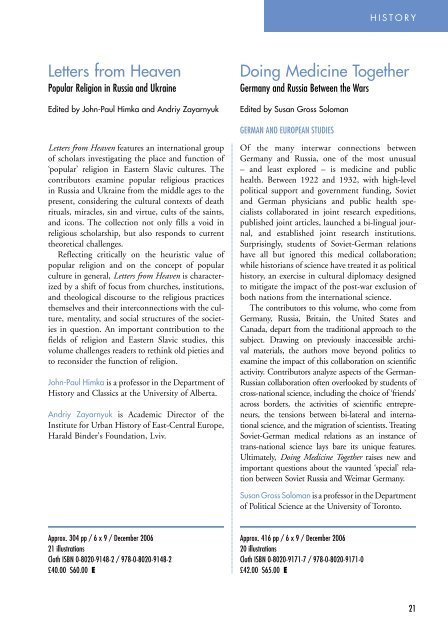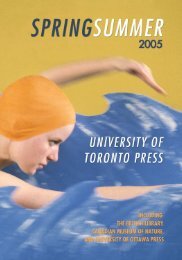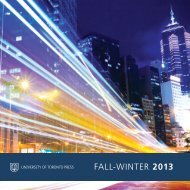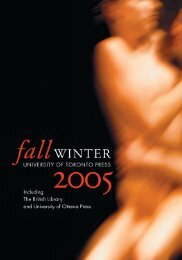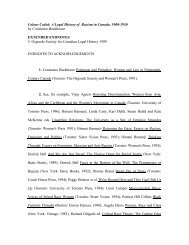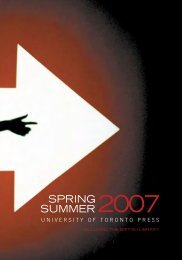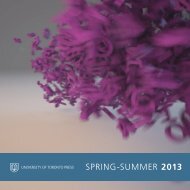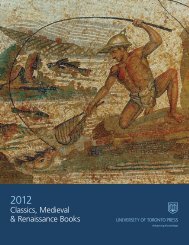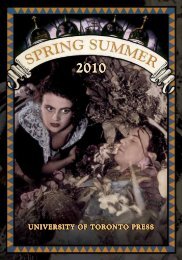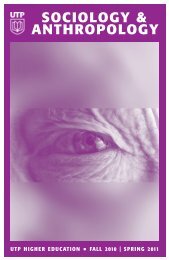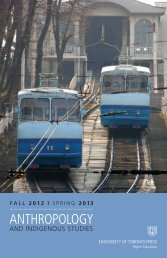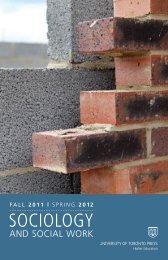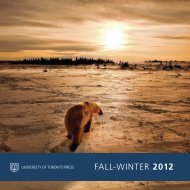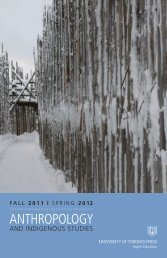Fall/Winter 2006 - University of Toronto Press Publishing
Fall/Winter 2006 - University of Toronto Press Publishing
Fall/Winter 2006 - University of Toronto Press Publishing
Create successful ePaper yourself
Turn your PDF publications into a flip-book with our unique Google optimized e-Paper software.
H I S T O R Y<br />
Letters from Heaven<br />
Popular Religion in Russia and Ukraine<br />
Edited by John-Paul Himka and Andriy Zayarnyuk<br />
Doing Medicine Together<br />
Germany and Russia Between the Wars<br />
Edited by Susan Gross Soloman<br />
GERMAN AND EUROPEAN STUDIES<br />
Letters from Heaven features an international group<br />
<strong>of</strong> scholars investigating the place and function <strong>of</strong><br />
‘popular’ religion in Eastern Slavic cultures. The<br />
contributors examine popular religious practices<br />
in Russia and Ukraine from the middle ages to the<br />
present, considering the cultural contexts <strong>of</strong> death<br />
rituals, miracles, sin and virtue, cults <strong>of</strong> the saints,<br />
and icons. The collection not only fills a void in<br />
religious scholarship, but also responds to current<br />
theoretical challenges.<br />
Reflecting critically on the heuristic value <strong>of</strong><br />
popular religion and on the concept <strong>of</strong> popular<br />
culture in general, Letters from Heaven is characterized<br />
by a shift <strong>of</strong> focus from churches, institutions,<br />
and theological discourse to the religious practices<br />
themselves and their interconnections with the culture,<br />
mentality, and social structures <strong>of</strong> the societies<br />
in question. An important contribution to the<br />
fields <strong>of</strong> religion and Eastern Slavic studies, this<br />
volume challenges readers to rethink old pieties and<br />
to reconsider the function <strong>of</strong> religion.<br />
John-Paul Himka is a pr<strong>of</strong>essor in the Department <strong>of</strong><br />
History and Classics at the <strong>University</strong> <strong>of</strong> Alberta.<br />
Andriy Zayarnyuk is Academic Director <strong>of</strong> the<br />
Institute for Urban History <strong>of</strong> East-Central Europe,<br />
Harald Binder's Foundation, Lviv.<br />
Of the many interwar connections between<br />
Germany and Russia, one <strong>of</strong> the most unusual<br />
– and least explored – is medicine and public<br />
health. Between 1922 and 1932, with high-level<br />
political support and government funding, Soviet<br />
and German physicians and public health specialists<br />
collaborated in joint research expeditions,<br />
published joint articles, launched a bi-lingual journal,<br />
and established joint research institutions.<br />
Surprisingly, students <strong>of</strong> Soviet-German relations<br />
have all but ignored this medical collaboration;<br />
while historians <strong>of</strong> science have treated it as political<br />
history, an exercise in cultural diplomacy designed<br />
to mitigate the impact <strong>of</strong> the post-war exclusion <strong>of</strong><br />
both nations from the international science.<br />
The contributors to this volume, who come from<br />
Germany, Russia, Britain, the United States and<br />
Canada, depart from the traditional approach to the<br />
subject. Drawing on previously inaccessible archival<br />
materials, the authors move beyond politics to<br />
examine the impact <strong>of</strong> this collaboration on scientific<br />
activity. Contributors analyze aspects <strong>of</strong> the German-<br />
Russian collaboration <strong>of</strong>ten overlooked by students <strong>of</strong><br />
cross-national science, including the choice <strong>of</strong> ‘friends’<br />
across borders, the activities <strong>of</strong> scientific entrepreneurs,<br />
the tensions between bi-lateral and international<br />
science, and the migration <strong>of</strong> scientists. Treating<br />
Soviet-German medical relations as an instance <strong>of</strong><br />
trans-national science lays bare its unique features.<br />
Ultimately, Doing Medicine Together raises new and<br />
important questions about the vaunted ‘special’ relation<br />
between Soviet Russia and Weimar Germany.<br />
Susan Gross Soloman is a pr<strong>of</strong>essor in the Department<br />
<strong>of</strong> Political Science at the <strong>University</strong> <strong>of</strong> <strong>Toronto</strong>.<br />
Approx. 304 pp / 6 x 9 / December <strong>2006</strong><br />
21 illustrations<br />
Cloth ISBN 0-8020-9148-2 / 978-0-8020-9148-2<br />
£40.00 $60.00 E<br />
Approx. 416 pp / 6 x 9 / December <strong>2006</strong><br />
20 illustrations<br />
Cloth ISBN 0-8020-9171-7 / 978-0-8020-9171-0<br />
£42.00 $65.00 E<br />
21


